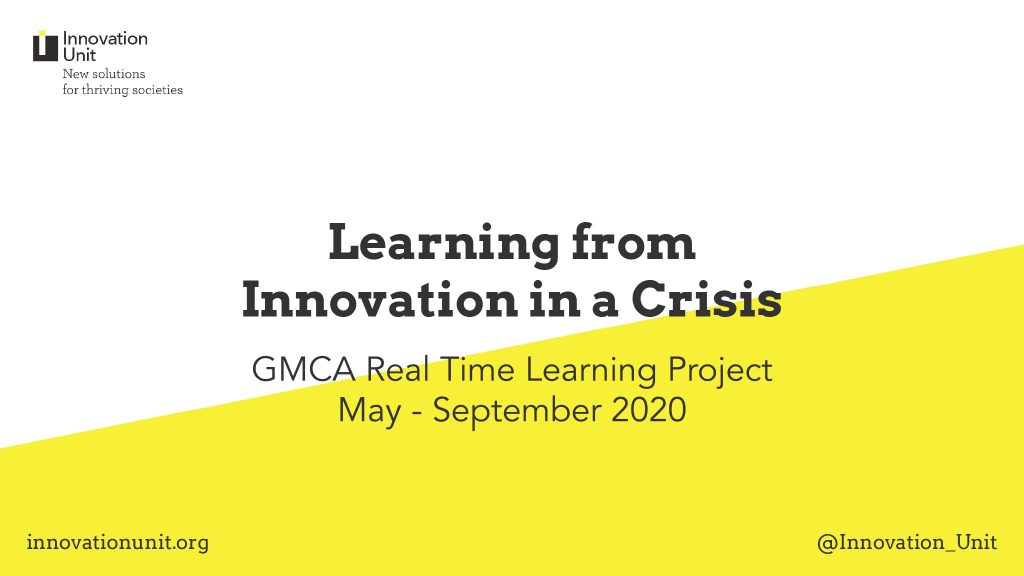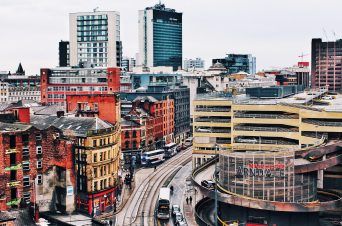Learning from Innovation in a Crisis
Greater Manchester’s real time learning project
With Greater Manchester Combined Authority
As an external force, Covid has been a great disruptor, forcing new ways of working and revealing new possibilities for the future.
Many organisations have adapted to meet their communities’ needs. Some have captured what they’ve learned, a few have been brave enough to challenge their business as usual.
Across Greater Manchester in 2020, providers of public services, voluntary and community organisations, businesses, families and individuals mobilised and committed their talents, energy and resources to protecting the most vulnerable members of their communities.
Determined to capture and learn from the experiences and insights of the innovators, the Public Service Reform Team in the Greater Manchester Combined Authority partnered with Innovation Unit to look into activities in three main areas: early help for families with young children, support provided by community hubs and an emergency response for homeless people and rough sleepers.
New ways of working were captured across four themes:
- Practice and citizen experience: what happens on the frontline
- Workforce and culture: what it’s like to work in Greater Manchester
- Leadership and governance: how direction is set and who makes decisions
- System conditions: what regulations, funding, data, accountability are required.
Approach
Over 100 people from different service areas from across the 10 local authorities took part in 12 workshops to consider how to ‘design forward differently’ as well as ‘build back better’.
Facilitation was crucial to the success of these workshops, as participants had diverse experiences and perspectives on the crisis and its implications for public services. The facilitated peer learning approach is illustrated in the diagram, below.

Impact: response from GMCA
“When the pandemic hit the change in the pace and rhythm of work across the Greater Manchester public service system was palpable,” says Dave Kelly, GMCA’s Head of Reform.
“Colleagues from across our localities were responding to immediate humanitarian need in their communities and our city-region wide machinery was geared into action to respond to a number of crisis issues, for example the ‘Everyone In’ response to rough sleeping and homelessness.
“As a combined authority area with a vantage point across 10 local authority areas covering almost three million residents, we could see a clear need to convene a space for learning and reflection. In what was a world of at least 1,000 spinning plates we knew that we could call on our partnership with the Innovation Unit to help facilitate the extraction of real time learning in responding to the pandemic and unearth the innovations behind it. The headlines of that learning are captured in this blog post with more detail to come over the coming weeks.
“The learning from the exercise is insightful but for us it is also reassuring. In July 2019 we published our white paper on ‘Unified Public Services for the People of Greater Manchester’. This is a model of public services that is integrated around people, prevention and place. COVID brought that model to life, literally overnight.
“It demonstrated that an approach to change doesn’t need to be tied down to Gantt charts and bureaucratic programme boards. Real change happens by doing and that’s exactly what happened.”
What the COVID experience and the distillation of this work has led to is sight of a new horizon of future possibility. It has evidenced that we can work in a way that demonstrates unified public services but it has also shown how much more radical we can be in pursuing our future ambitions.Dave Kelly, Head of Reform, Greater Manchester Combined Authority
Lessons from the project
The lessons from the project are set out in the new report, ‘Learning from Innovation in a Crisis’. It comprehensively explores the findings from the workshops, as well as including in full a detailed report from a deep dive, local enquiry in Oldham exploring the emergency response from the point of view of residents and the informal groups and leaders who are part of the fabric of local communities.
Click the image to download.

